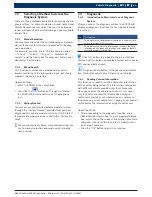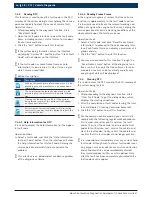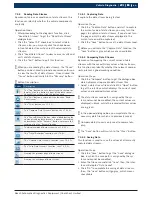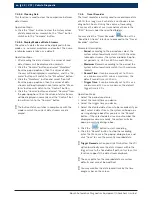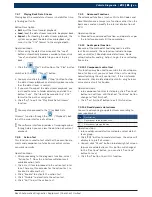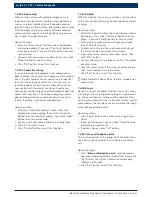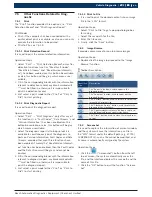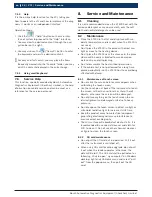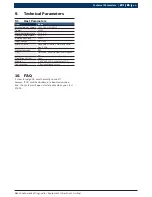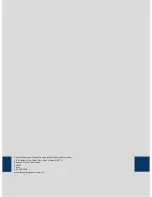
Bosch Automotive Diagnostics Equipment (Shenzhen) Limited
18 | ��� | �ehicle Diagnostic
en
7.4.�
Reading DT�
This function is used to read the fault code in the ECU
memory of the system being tested, helping the service
personnel quickly find out the cause of vehicle fault.
Operation Steps:
1.
After proceeding to the diagnosis function, click
“Read Fault Code”.
2.
Open the fault code interface to view the fault code
items, including content, status (current or random),
freeze frame and help.
3.
Click the “Exit” button to quit this function.
i
If the system being tested is normal, the interface
will display “System OK” and the button “Clear Fault
Code” will not appear on the interface.
i
If the fault code has some freeze frame or help
information, its icon is blue. Or else, its icon is gray,
which means unavailable.
i
Button Description:
Button
Description
Reading the freeze frame information; when it is dis-
played in grey, this means there is no freeze frame
information;
The help information for fault code; when it is dis-
played in gray, this means there is no help informa-
tion;
Clearing the fault code, see 9.3.4; if the system
being tested is normal, this button will not appear
on the current interface;
Refreshing the current fault code; after eliminating
some faults, you may click this button to refresh the
existing fault codes.
7.4.�.1 Help �nformation for DT�
It is used to display the help information for the opposi-
te fault code.
Operation Steps:
¶
Select a fault code, and click the “Help Information
for Fault Code” button. Then the interface will show
the help information for this fault code, helping the
service personnel quickly find out and solve the
problem.
i
This interface is an independent window, regardless
of the diagnosis software.
7.4.�.2 Reading Freeze Frame
In the engine management system, the freeze frame
function is supplementary to the fault code function.
It is basically used to freeze the relevant working con-
ditions of engine when engine fault arises, helping the
service personnel know the working conditions of the
whole vehicle upon the fault occurrence.
Operation Steps:
1.
Select a fault code, and click “Read Freeze Frame
Information” to proceed to the corresponding inter-
face. Each freeze frame can display a maximum of 5
groups of data;
2.
Click the “Exit” button to quit this function.
i
You may also proceed to this function through the
“Read Freeze Frame” button at the diagnosis func-
tion area, but then only the freeze frames for com-
mon data streams can be read and generally only
one group of data will be displayed.
7.4.4
�learing DT�
It is used to clear the DTC saved in the ECU memory of
the system being tested.
Operation Steps:
1.
After proceeding to the diagnosis function, click
“Clear Fault Code” to get the dialogue box, which
displays the clearing conditions.
2.
After the completion of fault code clearing, the inter-
face will display “Clearing Command Executed”;
3.
Click the “OK” button to quit this function.
i
For the common vehicle models, you shall strictly
comply with the following regular work procedures:
firstly, read, record (or print) and clear the fault
codes; then, test the vehicle, and re-read the fault
codes for verification; next, service the vehicle and
clear the fault codes; finally, re-test the vehicle and
confirm that the fault codes are no longer present;
i
It is impossible to immediately clear any current hard
fault code. Although such technical fault codes invol-
ving oxygen sensor, knock sensor, mixture correction
and cylinder misfire can be immediately cleared,
they would reappear within a certain period. Only
after the fault has been completely eliminated will a
fault code never reappear.
Summary of Contents for KT400
Page 1: ...VCI User Manual ...
Page 2: ......














